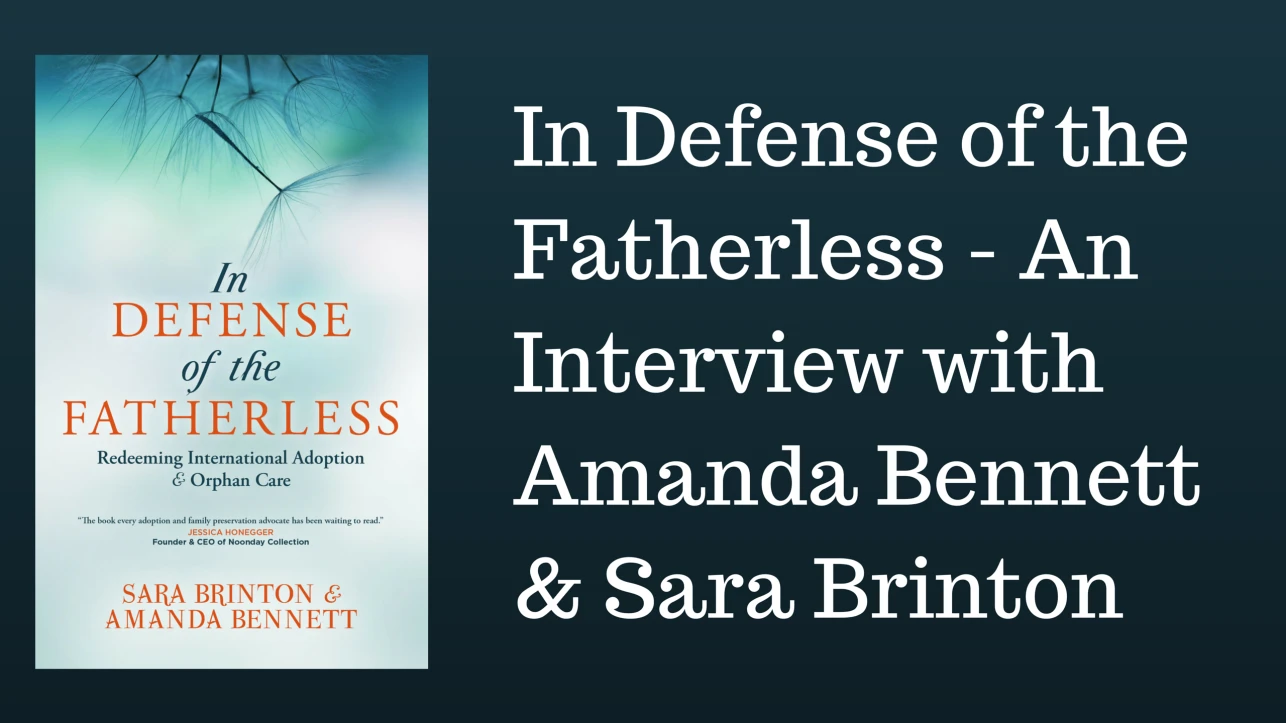In Defense of the Fatherless - An Interview with Amanda Bennett & Sara Brinton
New Releases, Updates and More


In Defense of the Fatherless
We often hear the term “global orphan crisis” and statistics like “151 million orphans.” How does this description sometimes misrepresent the situation? What is the actual reality of the global orphan crisis?
- Sara: Christians are responding to what we believe is an overwhelming crisis. When we hear about 151 million orphans, we imagine a world full of vulnerable children who are growing up in orphanages or on the street.
- Amanda: When my husband and I began to learn about the needs of vulnerable children and the adoption process, I pictured orphans as children who were alone with no family. I assumed there was an overwhelming need for international adoption.
- Sara: As we have traveled the world and interviewed adoptive families and experts, we’ve found that people use the term “orphan” to mean different things. The statistics can be misleading. The truth is the majority of the world’s orphans do not live in orphanages or on the streets – and only a tiny fraction of the world’s orphans need international adoption.
- Amanda: According to UNICEF, children are considered orphans if they experienced the death of one or both of their parents. By this definition, there are an estimated 151 million orphans in the world today, but more than 90% of these children live with their families.
- Sara: There are millions of children in the world today who are vulnerable because of poverty, injustice or broken families. There is a crisis and I believe Christians are called to respond – but adoption alone isn’t the answer.
What is the link between widows and orphans today? Why is it so important that we consider the two together?
- Amanda: The Bible doesn’t separate orphans and widows – and rightly so! Most of the world’s orphans are living with their widowed mothers. The Bible calls Christians to care for “widows and orphans in their distress,” (James 1:27).
- Sara: Throughout the Bible, we discover God’s heart for all who are powerless. In ancient Jewish culture, orphans and widows would have been vulnerable to exploitation. God calls himself the “Father of the fatherless and protector of widows,” (Psalm 68:5). As the perfect Father, God protects and provides for his children. I believe we are called to demonstrate his mercy and justice to a broken world.
- Amanda: We live in a world where there are 115 million widows caring for vulnerable children in desperate poverty. One of the most powerful things we can do to respond is to empower these mothers and grandmothers to care for their children.
Many Christians have responded to the biblical call to care for orphans with an urgent desire to “do something.” You argue, though, that sometimes “doing something” may be worse than doing nothing at all. What are some examples?
- Sara: Over the last decade, many Christians have responded to the orphan crisis in three ways: supporting orphanages, visiting orphans on short-term mission trips and encouraging adoption. While these responses can be helpful, they can also hurt the children and families we want to help.
- Amanda: Imagine a short-term mission team that travels from the United States to Uganda to paint an orphanage and care for orphans. By essentially taking a job away from a local painter, the trip hurts the local economy. Volunteers who come and leave can have a devastating impact on children who have already lost their families. This is an example of a situation where good intentions are not enough.
For the biblically-minded Christian who desperately wants to “do something” to help orphans, what is the appropriate starting point?
- Sara: If we want to make a lasting difference, let’s begin by seeking wisdom. I want to encourage Christians to open the Bible and the newspaper side by side. Study what the Bible teaches about orphans and widows, poverty and injustice – from beginning to end - and then learn about the issues at the root of the orphan crisis.
- Amanda: And we should start with prayer! God promises to give wisdom to us when we ask. It’s easy to underestimate the power of the Holy Spirit when believers come together to pray. So let’s remember God’s power and pray that God would call Christians all over the world to care for vulnerable children and families.
- Sara: If you feel called to adopt, my advice is really simple: adopt a child who needs to be adopted. There are thousands of children waiting in foster care in our communities who need adoption. If you feel called to adopt internationally, consider adopting a waiting child from a country that has an ethical, transparent adoption system.
- Amanda: One of the most effective ways to make a difference in a vulnerable community is to partner with a local church. Empower believers to care for the orphans and widows in their neighborhood. Local leaders are the experts in the needs of the community and are in the best position to make a lasting difference.
- Sara: Remember that the gospel is good news for broken families. The gospel gives us everything we need to address the poverty and injustice at the root of the orphan crisis.

Amanda Bennett
About Amanda Bennett:
Amanda Bennett is a lawyer living in in Kigali, Rwanda with her husband and son. She serves on the board of directors for Reeds of Hope, a non-profit serving vulnerable families and children in DRC.
About Sara Brinton:

Sara Brinton
Sara Brinton is a writer and social entrepreneur with a passion for reforming international adoption and orphan care. She lives in Austin, Texas with their four children, including daughter Gabrielle who was adopted from Uganda.
Connect with Sara:
- DefenseOfTheFatherless.com
- Twitter (@FromMomToMum)
Where to Buy:
In Defense of the Fatherless is available at any good Christian bookstore. If you don’t have a Christian bookstore near you, you may want to consider purchasing a copy from one of the online book retailers listed below:
Buy Now: Christian Focus: Paperback Amazon: Paperback | Kindle Apple: iBooks Barnes & Noble: Paperback | Nook Koorong: Paperback CLC Bookshops: Paperback 10ofThose: Paperback
